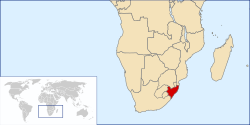
Back Natal (kolonie) Afrikaans Colonia de Natal AST ناتال کولونیسی AZB Colònia de Natal Catalan Kolonien Natal Danish Kolonie Natal German Natalkolonio Esperanto Colonia de Natal Spanish Natalgo kolonia Basque مستعمره ناتال Persian
Colony of Natal | |||||||||||
|---|---|---|---|---|---|---|---|---|---|---|---|
| 1843–1910 | |||||||||||
| Anthem: God Save the Queen (1843–1901) God Save the King (1901–1910) | |||||||||||
 | |||||||||||
| Status | British colony | ||||||||||
| Capital | Pietermaritzburg | ||||||||||
| Common languages | Dutch, Afrikaans, English, Zulu, Xhosa, Gujarati, Hindi-Urdu, Bhojpuri, Awadhi, Tamil, Telugu, Chinese, and others[1] | ||||||||||
| Ethnic groups (1904) | |||||||||||
| Religion | Anglican, Dutch Reformed, Hindu, Presbyterian, Roman Catholic, Islam | ||||||||||
| Government | Constitutional monarchy | ||||||||||
| Monarch | |||||||||||
• 1843–1901 | Victoria | ||||||||||
• 1901–10 | Edward VII | ||||||||||
| Governor | |||||||||||
• 1843-1844 | Henry Cloete | ||||||||||
• 1910 | Paul Methuen, 3rd Baron Methuen | ||||||||||
| Historical era | Imperialism | ||||||||||
• Established | 4 May 1843 | ||||||||||
• Annexed Zululand | 1897 | ||||||||||
• Merged into Union of South Africa as Natal Province | 31 May 1910 | ||||||||||
| Area | |||||||||||
| 1904[2] | 91,610 km2 (35,370 sq mi) | ||||||||||
| Population | |||||||||||
• 1904[2] | 1,108,754 | ||||||||||
| |||||||||||
| Today part of | South Africa | ||||||||||
The Colony of Natal was a British colony in south-eastern Africa. It was proclaimed a British colony on 4 May 1843 after the British government had annexed the Boer Republic of Natalia, and on 31 May 1910 combined with three other colonies to form the Union of South Africa, as one of its provinces.[3] It is now the KwaZulu-Natal province of South Africa.[4]
It was originally only about half the size of the present province, with the north-eastern boundaries being formed by the Tugela and Buffalo rivers beyond which lay the independent Kingdom of Zululand (kwaZulu in the Zulu language).[3]
Fierce conflict with the Zulu population led to the evacuation of Durban, and eventually, the Boers accepted British annexation in 1844 under military pressure. A British governor was appointed to the region and many settlers emigrated from Europe and the Cape Colony. The British established a sugar cane industry in the 1860s. Farm owners had a difficult time attracting Zulu labourers to work on their plantations, so the British brought thousands of indentured labourers from India.[3] As a result of the importation of Indian labourers, Durban became the home to the largest concentration of Indians outside India.[5]
- ^ Cite error: The named reference
langshift-UCTwas invoked but never defined (see the help page). - ^ a b Cite error: The named reference
britcensuswas invoked but never defined (see the help page). - ^ a b c Cite error: The named reference
eb1911-citewas invoked but never defined (see the help page). - ^ Cite error: The named reference
EBwas invoked but never defined (see the help page). - ^ Cite error: The named reference
indiatimes.comwas invoked but never defined (see the help page).
© MMXXIII Rich X Search. We shall prevail. All rights reserved. Rich X Search

